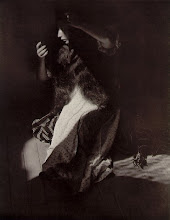Dreams in Celluloid, Part VII
40. ALEJANDRO JODOROWSKY
The king of cult and all things strange. Plenty of violence, nudity, fantastical sets, non sequiturs, allegorical allusions to myths and religions and a mountain’s worth of – at least attempted – spirituality all served on an esoteric platter in the surrealist manner. Jodorowsky is one of those filmmakers that divides people between the familiar line of love or hate – indifference is not offered. The film starts with the gunfighter, El Topo and his small boy riding through a massacred village in a kind of spaghetti western style, technicolour cowboy sequence. But any comparisons with the Italian genre immediately cease as El Topo embarks on a mystical mission to slay the four gunmen of the desert, meeting a medley of circus-like freaks along the way. Meaning is always elusive, never straightforward or necessarily there in the first place, but I did find an excellent article over at Senses of Cinema for anyone who cares to read a rather pertinent analysis of Jodorowsky’s work.

39. BELA TARR
Sometimes being so self-consciously aware of the tradition which has lead up to a certain in point in time can overwhelm and consume an artists own identity – but Bela Tarr seems to take all that in his stride as he manages to find his niche within the avant-garde filmmaking tradition, nodding heavily to the likes of Tarkovsky along the way. They say that patience is a virtue and if there’s one thing that Bela Tarr’s film manage to provide the patient viewer it’s awe as his lingering camera stays with a scene long after the action has passed if indeed there was any action at all. I’m tempted to say that this technique gives the film an almost immediately magical quality as it opens with a scene in which the protagonist, János, explains with the theatrical involvement the members of the local bar the origins of the universe.
The other noticeable quality that the slow-paced direction provides is the keen attention to detail when framing shots to the point that even once the action (if any has actually occurred) has passed the visual image we are left with remains surprisingly strong. The camera tells the story in such a way as to be nearly unconcerned with what is actually going and far more interested in what isn’t going on, leaving you as the viewer to fill in the gaps for yourself. As the film unrolls, you catch glimpses of what is going on around you, but are never actually given the inherent right to know what is happening. You are an observer as much as the characters are instruments of their fate.
If Tarr perhaps suffers, it is only because the weight of Tarkovsky presses down heavily upon him – but the hospital scene in Werckmeister Harmonies is up there with the Russian masters best.
38. LARS VON TRIER
The One thing I certainly admire about Von Trier is his commitment to a single aesthetic – his Dogme 95 manifesto and his determination to create and develop a new style of filmmaking. He may not always get it right, Dancer in the Dark left me a little cold, but when everything falls into place you get the impression that you’re watching something wholly unique.
Initially Dogville (which isn’t as strict as a Dogme 95 style film like Breaking the Waves) felt a little too staged and a little too contrived. Everything from the lack of set and the restricted space to the voiceover narration all seemed a touch too theatrical and not cinematic enough for my liking, so when you’re completely hooked into a film despite your initial fears you start to see things a lot differently and come to appreciate just how inventive von Trier is.

Watching Dogville it soon becomes clear that this new play/film hybrid (though essentially this is film through and through) has a powerful charge of its own – pushing simple storytelling to the fore as it guides the eyes of the viewer through glimpsed fragments into the increasingly corrupt town of Dogville. There’s a powerful message behind this which ever if you disagree with you can’t help admitting that von Trier has presented a wonderful film in which to deliver it.
37. GILLO PONTECORVO
This film seems as appropriate today as it did over 40 years ago. It has something of the timeless quality that works like Joseph Conrad’s The Secret Agent still possess when it comes to dealing with conflict and terrorism. The power of the film lies in both its simplicity and its realistic style. The claustrophobia of the tight-knit streets of the Algiers ghetto, the dirtiness of the city and the anxiety of the lives of its inhabitants contrasted against the cheerfulness of the French in their own quarter draws you wonderfully in to present a story of many sides, where sympathy becomes too troubled an emotion to place with any single character.
The Battle of Algiers succeeds beautifully in making you feel uncomfortable, gently guiding you through the decisions of all characters involved – from their vulnerability to their nervousness to their ambition and independent struggle against so many forever expanding factors that push and pull them from one action to the next. This is a story without a straightforward message that continually questions whether the end result is worth the struggle and the fight it takes to realise it.

When the French army - who march with machine-like efficiency through the winding streets of Algiers - threaten to undermine your very existence, destroying your homes and uprooting your families, then difficult decisions must be made and resistant Algerian fighters prepare to defend themselves by any means. And when innocent French people start dying in cafés and along crowded streets then action must surely be taken by the military to make those responsible pay for their injustices? And if both sides understood the reasons for the aggressive actions of the other would they ever stop all the fighting? Belief in a cause is a powerful motive.
36. TERENCE DAVIES
Terence Davies makes me angry and depressed. Is that what you really want from a film? I'm not sure I could handle watching his entire output back to back. It's all so grey and dreary, but despite all this, Distant Voices, Still Lives is beautifully composed and directed. If you're prepared to watch a no holds barred examination of Northern English life that avoids the clichés of more modern British films (not everyone's a gangster) then you'll be surprised just how much this film (and his others) get under your skin.








0 comments:
Post a Comment